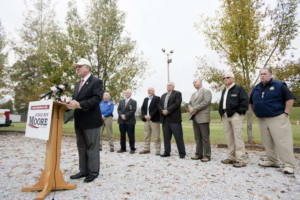A Hollywood film mogul has had his career wiped out over allegations of rape. Same for an Academy Award-winning actor. Women are streaming forward to say “Me, too.” The public seems to more or less have accepted the women’s view of what happened with these men.
Many other men in the entertainment industry are facing similar accusations.
OK, then. What about a candidate for the U.S. Senate? A Republican former state supreme court chief justice is facing charges of sexual contact with an underage girl.
Who do we believe here? Roy Moore, the accused candidate, or the woman who was 14 years of age at the time the incident allegedly occurred?
This “Me too” environment has elevated the issue of sexual abuse, sexual assault and sexual harassment to a whole new level of visibility.
I am in no position to assess the value of what the accuser has said Moore supposedly did. Republican leaders are saying that “if it’s true,” Moore has to pull out of his Senate contest against Democratic opponent Doug Jones.
Here is where the matter gets sticky. The election will take place slightly more than a month from now. How does someone prove an allegation of a crime that occurred nearly 40 years ago in such a short span of time? Absent that proof, how do voters respond?
Moore is entitled to the presumption of innocence. Then again, so are the many other men in public life who’ve been accused of sex crimes ranging from making inappropriate remarks to flat-out rape. The public, though, is quick to presume the worst about those others.
Will the voters in Alabama do the same to Roy Moore?
This situation is going to get real sticky … real fast.
